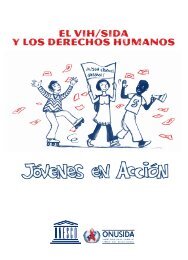the impact of hiv/aids on the education sector in tanzania
the impact of hiv/aids on the education sector in tanzania
the impact of hiv/aids on the education sector in tanzania
You also want an ePaper? Increase the reach of your titles
YUMPU automatically turns print PDFs into web optimized ePapers that Google loves.
EXECUTIVE SUMMARY<br />
This is an <str<strong>on</strong>g>impact</str<strong>on</strong>g> study, which exam<strong>in</strong>es policy framework, leadership commitment,<br />
political will<strong>in</strong>gness and advocacy issues <strong>on</strong> HIV/AIDS, as well as <str<strong>on</strong>g>the</str<strong>on</strong>g> implementati<strong>on</strong> <str<strong>on</strong>g>of</str<strong>on</strong>g><br />
HIV/AIDS <strong>in</strong>terventi<strong>on</strong>s <strong>in</strong> <str<strong>on</strong>g>the</str<strong>on</strong>g> educati<strong>on</strong> <strong>sector</strong>. It is expected to c<strong>on</strong>tribute to a better<br />
understand<strong>in</strong>g <str<strong>on</strong>g>of</str<strong>on</strong>g> <str<strong>on</strong>g>the</str<strong>on</strong>g> role and importance <str<strong>on</strong>g>of</str<strong>on</strong>g> a comprehensive and effective HIV/AIDS<br />
educati<strong>on</strong> policy, <str<strong>on</strong>g>of</str<strong>on</strong>g> committed leadership and <str<strong>on</strong>g>of</str<strong>on</strong>g> firm and c<strong>on</strong>sistent advocacy aga<strong>in</strong>st <str<strong>on</strong>g>the</str<strong>on</strong>g><br />
HIV/AIDS epidemic.<br />
HIV/AIDS c<strong>on</strong>t<strong>in</strong>ues to spread despite <str<strong>on</strong>g>the</str<strong>on</strong>g> use <str<strong>on</strong>g>of</str<strong>on</strong>g> leadership advocacy am<strong>on</strong>g <str<strong>on</strong>g>the</str<strong>on</strong>g><br />
Tanzanian populati<strong>on</strong> to raise general awareness <str<strong>on</strong>g>of</str<strong>on</strong>g> <str<strong>on</strong>g>the</str<strong>on</strong>g> severity <str<strong>on</strong>g>of</str<strong>on</strong>g> <str<strong>on</strong>g>the</str<strong>on</strong>g> epidemic and<br />
knowledge <str<strong>on</strong>g>of</str<strong>on</strong>g> how HIV transmissi<strong>on</strong> can be prevented, and also <strong>in</strong> spite <str<strong>on</strong>g>of</str<strong>on</strong>g> <str<strong>on</strong>g>the</str<strong>on</strong>g> presence <str<strong>on</strong>g>of</str<strong>on</strong>g> a<br />
nati<strong>on</strong>al policy for <str<strong>on</strong>g>the</str<strong>on</strong>g> c<strong>on</strong>trol and preventi<strong>on</strong> <str<strong>on</strong>g>of</str<strong>on</strong>g> HIV/AIDS.<br />
The study was undertaken because <str<strong>on</strong>g>the</str<strong>on</strong>g> HIV/AIDS epidemic has emerged as a major<br />
threat to achiev<strong>in</strong>g Educati<strong>on</strong> for All (EFA) goals. Moreover no study carried out to date has<br />
c<strong>on</strong>sidered <str<strong>on</strong>g>the</str<strong>on</strong>g> <str<strong>on</strong>g>impact</str<strong>on</strong>g> <str<strong>on</strong>g>of</str<strong>on</strong>g> HIV/AIDS <strong>on</strong> policy, leadership and advocacy.<br />
Research was carried out <strong>in</strong> Ir<strong>in</strong>ga Urban District, M<strong>in</strong>istry <str<strong>on</strong>g>of</str<strong>on</strong>g> Educati<strong>on</strong> and Culture<br />
(MoEC) headquarters and some <str<strong>on</strong>g>of</str<strong>on</strong>g> its affiliated <strong>in</strong>stituti<strong>on</strong>s <strong>in</strong> Dar es Salaam. At MoEC<br />
headquarters data and <strong>in</strong>formati<strong>on</strong> were collected from seven heads <str<strong>on</strong>g>of</str<strong>on</strong>g> departments or<br />
directors, and mid-level MoEC <str<strong>on</strong>g>of</str<strong>on</strong>g>ficials from all directorates, <strong>in</strong>clud<strong>in</strong>g adm<strong>in</strong>istrators,<br />
technical staff and peer educators. Interviews were also c<strong>on</strong>ducted with low-level MoEC staff,<br />
<strong>in</strong>clud<strong>in</strong>g messengers, cleaners and pr<strong>in</strong>t assistants from all directorates. At <str<strong>on</strong>g>the</str<strong>on</strong>g> regi<strong>on</strong>al and<br />
district levels <strong>in</strong>terviews were held with <str<strong>on</strong>g>the</str<strong>on</strong>g> Regi<strong>on</strong>al Educati<strong>on</strong> Officer, District Educati<strong>on</strong><br />
Officer, District School Inspector, Act<strong>in</strong>g Treasurer Ir<strong>in</strong>ga Urban District Council, District<br />
Medical Offer, District Teachers Uni<strong>on</strong> Secretary, Ward Educati<strong>on</strong> Coord<strong>in</strong>ator, Ir<strong>in</strong>ga Urban<br />
District Council, Mayor and District Executive Director.<br />
Data collecti<strong>on</strong> techniques used <strong>in</strong>clude structured and unstructured <strong>in</strong>terviews, focus<br />
group discussi<strong>on</strong>s (FGDs), checklists and a literature review.<br />
Globally <str<strong>on</strong>g>the</str<strong>on</strong>g> HIV/AIDS epidemic has proved to be much more extensive than<br />
predicted and is now reach<strong>in</strong>g alarm<strong>in</strong>g levels. Almost every pass<strong>in</strong>g year sees a revisi<strong>on</strong><br />
upwards <str<strong>on</strong>g>of</str<strong>on</strong>g> estimates and projecti<strong>on</strong>s. At <str<strong>on</strong>g>the</str<strong>on</strong>g> end <str<strong>on</strong>g>of</str<strong>on</strong>g> 2002, 5.0 milli<strong>on</strong> people were newly<br />
<strong>in</strong>fected with HIV, 42 milli<strong>on</strong> people were liv<strong>in</strong>g with HIV/AIDS and 3.1 milli<strong>on</strong> people had<br />
died as a result <str<strong>on</strong>g>of</str<strong>on</strong>g> AIDS. By <str<strong>on</strong>g>the</str<strong>on</strong>g> end <str<strong>on</strong>g>of</str<strong>on</strong>g> 2001 <str<strong>on</strong>g>the</str<strong>on</strong>g>re were 14 milli<strong>on</strong> AIDS orphans (UNAIDS<br />
and WHO, 2002).<br />
The first HIV/AIDS case <strong>in</strong> Tanzania was diagnosed <strong>in</strong> 1983 <strong>in</strong> Bukoba District <str<strong>on</strong>g>of</str<strong>on</strong>g><br />
Kagera Regi<strong>on</strong>. By 1986 <str<strong>on</strong>g>the</str<strong>on</strong>g> number <str<strong>on</strong>g>of</str<strong>on</strong>g> AIDS cases had risen from <str<strong>on</strong>g>the</str<strong>on</strong>g> <strong>in</strong>itial three to tens <str<strong>on</strong>g>of</str<strong>on</strong>g><br />
thousands countrywide. At <str<strong>on</strong>g>the</str<strong>on</strong>g> end <str<strong>on</strong>g>of</str<strong>on</strong>g> 2001 <str<strong>on</strong>g>the</str<strong>on</strong>g>re were 14,449 cumulative AIDS cases. Most<br />
cases fall with<strong>in</strong> <str<strong>on</strong>g>the</str<strong>on</strong>g> 20-49 age group, with <str<strong>on</strong>g>the</str<strong>on</strong>g> highest number <str<strong>on</strong>g>of</str<strong>on</strong>g> reported cases <strong>in</strong> <str<strong>on</strong>g>the</str<strong>on</strong>g> 25-34<br />
and 30-39 age groups for females and males respectively. However, <strong>in</strong>fecti<strong>on</strong> rates are<br />
decl<strong>in</strong><strong>in</strong>g <strong>in</strong> some regi<strong>on</strong>s (e.g. Kagera Regi<strong>on</strong>): a sign <str<strong>on</strong>g>of</str<strong>on</strong>g> hope that <str<strong>on</strong>g>the</str<strong>on</strong>g> devastat<strong>in</strong>g epidemic<br />
can be brought under c<strong>on</strong>trol.










